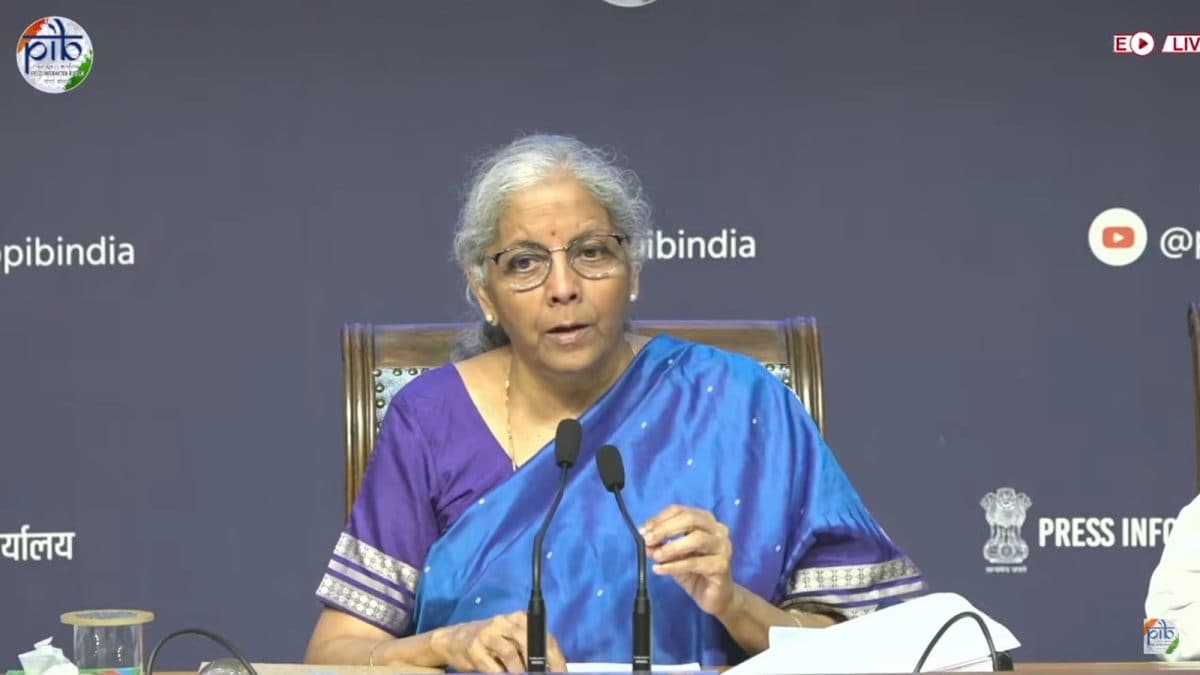Last Updated:
GST Council, led by Finance Minister Nirmala Sitharaman, has approved a sharp overhaul of the Goods and Services Tax (GST) structure

FM Nirmala Sitharaman
GST 2.0: In a sweeping reform, the GST Council, led by Finance Minister Nirmala Sitharaman, has approved a sharp overhaul of the Goods and Services Tax (GST) structure. Effective September 22, the system will be simplified into just two main slabs of 5% and 18%, replacing the current 12% and 28% rates, with a special 40% slab for luxury and sin goods. Billed as a “historic Diwali gift” for citizens and businesses, the reforms aim to lower the cost of living, boost consumption, and spur economic activity.
Big Savings on Essentials: Household products like hair oil, shampoo, toothpaste, toilet soaps, shaving cream and toothbrushes will now attract just 5% GST instead of 18%. Rates on butter, ghee, cheese, packaged namkeens, dairy spreads and utensils have been cut from 12% to 5%. Feeding bottles, clinical diapers and sewing machines too move into the lowest slab.
Healthcare Relief: Health and life insurance premiums, earlier taxed at 18%, are now exempt. Medical-grade oxygen, diagnostic kits, glucometers, test strips, corrective spectacles and thermometers will all attract only 5%.
Education Boost: Learning materials such as maps, charts, globes, notebooks, pencils, crayons, sharpeners, pastels and erasers have been fully exempted from GST.
Support for Farmers: Tractor tyres and parts now fall under 5% (down from 18%), while tractors drop from 12% to 5%. Bio-pesticides, micro-nutrients, drip irrigation systems and agricultural machinery also join the lower slab, easing input costs for farmers.
Cheaper Automobiles: Petrol, diesel and CNG cars within specified categories, earlier at 28%, will now face only 18%. The same applies to three-wheelers, motorcycles up to 350cc and commercial vehicles for goods transport.
Lower Prices for Appliances: Consumer durables including air conditioners, large televisions, monitors, projectors and dishwashers shift from 28% to 18%, making big-ticket appliances more affordable.
Process Reforms: Beyond rate cuts, the Council cleared procedural improvements such as automatic GST registration within three working days, provisional refunds via system-based evaluation, and simplified input tax credit rules.
Hon’ble Prime Minister Shri @narendramodi announced the Next-Generation GST Reforms in his Independence Day address from the ramparts of Red Fort.Working on the same principle, the GST Council has approved significant reforms today.
These reforms have a multi-sectoral and… pic.twitter.com/NzvvVScKCF
— Nirmala Sitharaman Office (@nsitharamanoffc) September 3, 2025
Prime Minister Narendra Modi, who had promised a “Diwali gift” in his Independence Day address, welcomed the reforms. He said the Union government had prepared a comprehensive plan for GST rationalisation to improve ease of living and strengthen the economy. “Glad to state that the GST Council, comprising the Union and the States, has collectively agreed to the proposals… These reforms will benefit the common man, farmers, MSMEs, middle class, women and youth, while ensuring ease of doing business for small traders and enterprises,” he said.
The government stressed that the new “Next-Gen GST” will not only cut taxes across critical sectors but also simplify compliance, reduce burden on consumers and businesses, and provide fresh momentum to growth.

Aparna Deb is a Subeditor and writes for the business vertical of News18.com. She has a nose for news that matters. She is inquisitive and curious about things. Among other things, financial markets, economy, a…Read More
Aparna Deb is a Subeditor and writes for the business vertical of News18.com. She has a nose for news that matters. She is inquisitive and curious about things. Among other things, financial markets, economy, a… Read More
Read More







